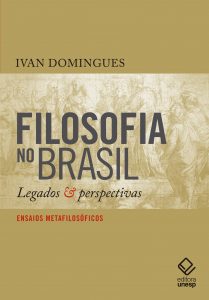A Philosopher Looks for a Way to Respond to a Deceptively Simple Question: Is There Such a Thing as “Brazilian Philosophy”?
Guided by that question, Ivan Domingues produces an imposing metaphilosophical essay, which shed a great deal of light on the history of ideas in Brazil and on the nation cultural formation

“Is there a Brazilian philosophy?” Ivan Domingues asks. To cast light on this question in Philosophy in Brazil: Legacies and Perspectives [Filosofia no Brasil: legados e perspectivas] (Editora Unesp), Domingues employs an essay as a literary device. The result is an extensive philosophical reflection upon philosophy itself, a meta-philosophical text whose “object happens to be the Brazilian philosophy, or more precisely, the philosophical problem of the existence (or non-existence) of a philosophy in Brazil that justifies the adjective ‘Brazilian’.”
He arranges his reflections into six chapters, “deployed as a sequence of argumentative steps with a controlled thematic unity.” The first step is dedicated to the delineation of the meta-philosophical argument for the possibility of any national philosophy with temporal boundaries, in which the purpose of the essay is discussed and the methodology is justified.” Domingues is closely attentive to the course of history of ideas in Brazil, from the Colonial Period to present, and the analytic undertake consists of intersecting the intellectual history and meta-philosophical investigation. In this complex setting, he debates the very nature of philosophical reason and the actual experience of thinking philosophically. He insists these are variable, demanding, always a careful contextual reconstruction,which will occupy the five subsequent chapters, from refining the focus of the problem to the examination of diverse possible perspectives on the topic.
Oswaldo Giacoia Junior notes in his preface that “Ivan Domingues makes liberal use of the ideal types of Max Weber (while taking into account the specific factors of the history of Brazil) to describe a succession of schools of thought and typical models of intellectual, whose specific nature and order of appearance reflected the vicissitudes and structural transformations of the national history.” This is the book setting to deploy a succession of ideal types: the essential intellectual of the church, or the Jesuit, in the colonial period; the deracinated dilletante in the times of the Empire and the Old Republic, a relic of the law; the scholar or virtuoso modeled by the “Mission Frances,” the type institutionalized in the foundation of University of São Paulo, which then spread throughout the rest of the country, promoted by CAPES and CNPq; then the philosopher as public intellectual in the wake of Zola and the French 3rd Republic, breaking onto the Brazilian scene only in the 1970s, in the setting of resistance to the military dictatorship; finally, the globalized cosmopolitan intellectual, a type to be discerned as much in the future as in the past. “These types,” Giacoia concludes, “could also be encountered in other cultures, but not in the same sequence and manner as it is in Brazil. That’s what makes the book special.”
 About the author – Ivan Domingues holds a doctorate in philosophy from the University Paris 1, and completed post-doctoral studies in the Universities of Oxford and Notre Dame. He is a professor in the Department of Philosophy of the Federal University of Minas Gerais (UFMG), where he coordinates the Nucleus of Studies of Contemporary Thought. He is the author of several books.
About the author – Ivan Domingues holds a doctorate in philosophy from the University Paris 1, and completed post-doctoral studies in the Universities of Oxford and Notre Dame. He is a professor in the Department of Philosophy of the Federal University of Minas Gerais (UFMG), where he coordinates the Nucleus of Studies of Contemporary Thought. He is the author of several books.
Títle: Phiosophy in Brazil: Legacies and perspectives – Metaphilosophical Essays [Filosofia no Brasil: legados e perspectivas – Ensaios metafilosóficos]
Author: Ivan Domingues
Pages: 561
Format: 16 x 23 cm
ISBN: 978-85-393-0667-1
Rights: worldwide free
